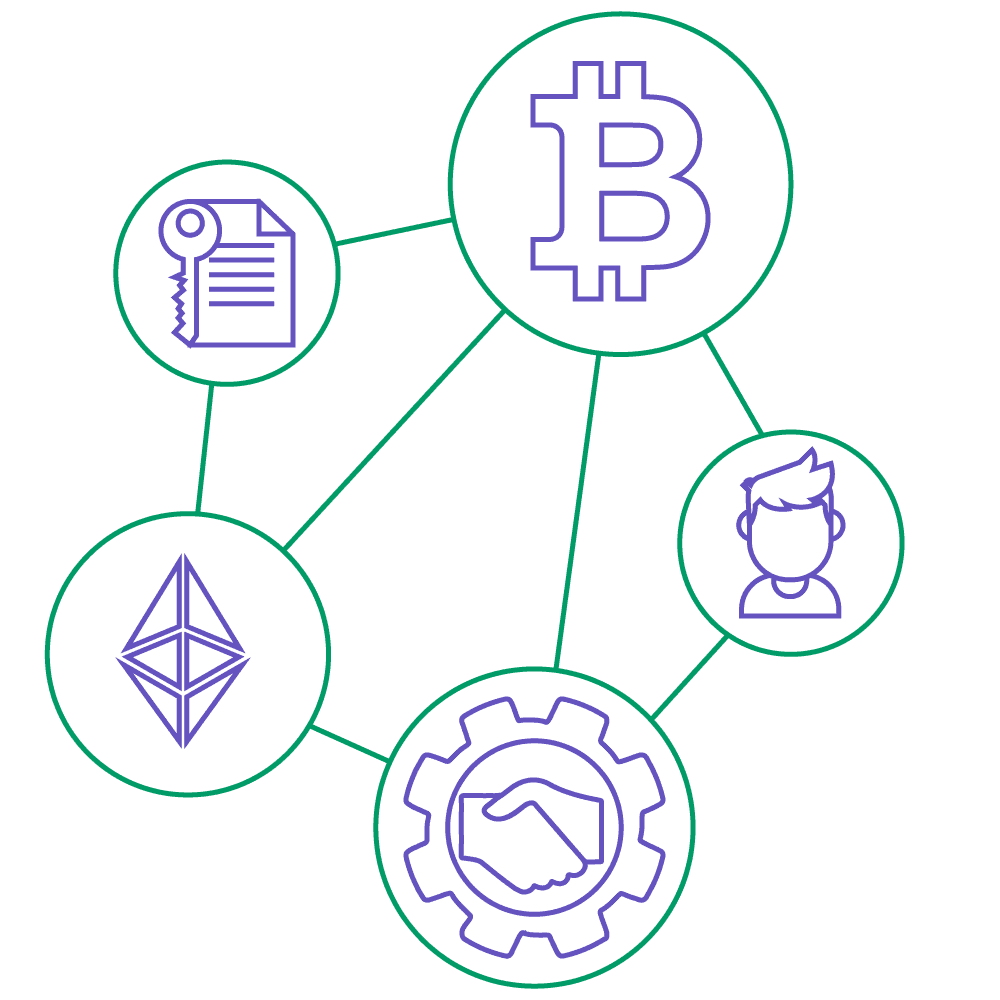The potential applicability of blockchain to facilitate business is very broad, which is why it gets so much attention. And, in a lot of ways, it has already been in major usage—if you define major usage as companies globally paying attention to the technology.
What is very important is that blockchain doesn’t have to be visibly adopted by a large population. It can operate in the background, like machine learning, for example. Machine learning isn’t a consumer technology, although consumers are affected by it.
Blockchain will stay in the background in a lot of ways, so it will become useful but invisible.
Banks and other financial institutions are implementing blockchain technology with different purposes. Here are the four most common use cases for blockchain in banking at the moment.
1. KYC and digital identity verification
Know your customer (KYC) is a procedure that financial institutions use to identify their clients and obtain certain and relevant information required to conduct business with an interested party. In the United States, the KYC procedure is a standard policy introduced as an adaptation to the customer identification program (CIP), which was established by the Bank Secrecy Act and the USA Patriot Act of 2001. KYC's policy is becoming increasingly global in the context of financial fraud, money laundering and terrorist financing.
Traditional KYC requires many steps to be taken, including:
- Face-to-face checking;
- Authentication (the bank client needs to prove their identity every time they log in to the service);
- Authorization (a proof of the client’s intentions is needed).
According to Refinitiv1 average onboarding times have risen from 28 days in 2016 to 32 days in 2017. The situation is not much better now, unless new technologies are applied.
Blockchain-based solution gives almost instantaneous identity verification, since the authentication system can be securely shared between departments, services and partners. Users can choose how they identify themselves and with whom they agree to share their identity. They still need to register their identity on the blockchain, but they do not need to repeat the registration for each service provider if those providers are also powered by blockchain.
2. Trade Finance
According to the World Trade Organization, about 80 to 90 percent of world trade relies on trade finance, mostly of a short-term nature.
Within a traditional trade finance system, all participants must maintain their own database for all transaction-related documents. Each of these databases must be constantly reconciled against each other, and a single error in one document can be duplicated to copies of the document. Implementation of blockchain technology could simplify this process, decreasing recordkeeping and data maintenance costs.
With blockchain each customer transaction would be stored in blockchain that serves as a single reference source. Such solution eliminates the need for several copies of the same document and can integrate all necessary information in one digital document, which is updated in real time and can be accessed by all network members. This might be applied to bills of lading, invoices or letters of credit.
3. Credit History
Credit history is crucial in the purchasing process whenever the customer needs a loan. This applies to all needs, from the fridge to the purchase of the property. Sometimes credit report is also required when applying for a job.
It may take a long time for lenders to review the borrower’s credit history. Traditional business credit reports provided by third-party credit bureaus are not available for small business owners.
The situation could radically change through blockchain, where people could store their credit history and decide with whom to share it. Blockchain-based credit reports reduce the costs and complexities pertaining to data verification. Besides, the data ownership is returned to individuals because it is no longer held in a central repository.
4. Smart loyalty programs
Beyond securing and streamlining financial processes, the blockchain can reform customer rewards systems. With blockchains, companies have access to a wide range of low-cost loyalty programs they can customize to meet the needs of distinct customer groups.
Proposed solution in this case would consist of internal ecosystem and digital currency. There are many blockchain ecosystems, including Waves, Loyyal, and Qiibee, that provide advanced rewards solutions. Qiibee, for example, creates a unique coin for each new partner. For instance, the company created the Sausalitos Coin for Sausalitos, Germany’s leading cocktail bar and restaurant chain.
Blockchain-based loyalty programs are fully trackable, so firms can analyze how much money was spent at any time, which programs work, and which don’t. The technology implementation reduces the program costs and risk of fraud.
How Softjourn can help you?
SNAPSHOT PROPOSAL 1
Project: Blockchain/Smart Contracts feasibility research for your bank
Research areas:
- Public vs. private blockchain systems
- Available technologies and pricing
- Identification of processes, flows and data streams
- Technology pros/cons
- Smart Contracts use in term lending
- Term lending based on blockchain
Technologies:
- Solidity
- Ethereum (most likely won’t be used but we will investigate more during our research)
- Quorum
- React, Redux, Final-Form
- Node.js, NestJS
- MySQL
- Docker
- React Native (if prototype includes mobile part)
- Other (that may come up during the research)
Development Approach:
- Adaptive, agile (we will adjust our prototype depending on research results).
Project deliverables:
- Research document with detailed feasibility report
- Working prototype created with the use of predefined technologies
- Technical documentation
SNAPSHOT PROPOSAL 2
Project: Determine the scope of a smart lending solution, using blockchain, based on the bank current lending process.
Deliverables:
- Solution Definition
- Solution Architecture
- Project outline including work breakdown, estimated timeline and corresponding cost/pricing for build/deploy
Project Phases:
- Solution definition. Softjourn business analysts and financial expert will conduct several working sessions with the bank subject matter experts (SME’s) including but not limited to, internal users of the current lending solution, managers and system administrator for the current lending application (or another appropriate person). The objective would be to understand the existing workflows, existing inputs/outputs, diagram the current solution, and then apply digital ledger technology to the service where the lending process can best take advantage of the technology. Deliverable: Detailed SRS for smart lending blockchain solution.
- Creation of solution architecture. Based on SRS, a Softjourn software architect will create the architecture of the solution describing recommended technologies and why we recommend them (or don't recommend, if any). Deliverable: Software architecture document
- Project Outline including work breakdown, estimated timeline and corresponding cost/pricing for build/deploy. Technical team will provide a detailed estimation of the solution, and outline of the build phases. Based on this corresponding cost can be calculated. Deliverable: Document including work breakdown, estimated timeline and pricing for build/deploy.





